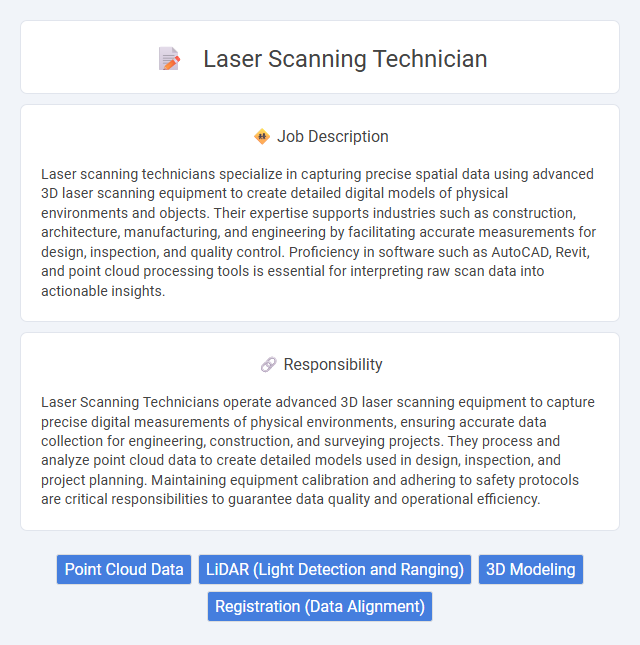
Laser scanning technicians specialize in capturing precise spatial data using advanced 3D laser scanning equipment to create detailed digital models of physical environments and objects. Their expertise supports industries such as construction, architecture, manufacturing, and engineering by facilitating accurate measurements for design, inspection, and quality control. Proficiency in software such as AutoCAD, Revit, and point cloud processing tools is essential for interpreting raw scan data into actionable insights.
Individuals with strong attention to detail and an interest in technology are likely to find a Laser Scanning Technician role suitable, as it involves precise measurement and data collection using advanced laser equipment. Those comfortable with physical activity and working outdoors in various environments may have a higher probability of thriving in this job due to frequent site visits. Candidates who prefer repetitive tasks or minimal social interaction might find the role less fitting, given the collaborative nature and problem-solving requirements.
Qualification
A Laser Scanning Technician must possess expertise in operating 3D laser scanning equipment and software such as Leica Cyclone and Faro Scene. Strong skills in point cloud processing, spatial data analysis, and CAD software proficiency are essential for accurate modeling and documentation. A background in surveying, engineering, or construction technology, along with certifications like Certified Laser Scanning Technician (CLST), enhances job qualification and credibility.
Responsibility
Laser Scanning Technicians operate advanced 3D laser scanning equipment to capture precise digital measurements of physical environments, ensuring accurate data collection for engineering, construction, and surveying projects. They process and analyze point cloud data to create detailed models used in design, inspection, and project planning. Maintaining equipment calibration and adhering to safety protocols are critical responsibilities to guarantee data quality and operational efficiency.
Benefit
Laser Scanning Technician roles likely offer significant benefits such as enhanced career opportunities in construction, engineering, and geospatial industries due to rising demand for precise 3D data capture. Professionals in this field may experience higher earning potential and skill development through exposure to advanced scanning technologies. Job stability is probable as industries increasingly adopt laser scanning for efficient project planning and quality assurance.
Challenge
Working as a Laser Scanning Technician likely involves navigating complex environments where precision and accuracy are crucial, presenting a constant challenge. The role may require adapting to varied project demands and troubleshooting technical issues with scanning equipment under tight deadlines. Mastery of advanced software and hardware could be essential to effectively capture and process detailed spatial data.
Career Advancement
Laser Scanning Technicians can advance their careers by gaining expertise in 3D modeling software and project management, increasing their value in construction, engineering, and surveying industries. Progression often leads to roles such as Lead Scanner, BIM Specialist, or Geospatial Analyst, where technical skills merge with strategic planning. Continuous certification and staying updated with the latest scanning technologies enhance opportunities for higher-paying positions and leadership responsibilities.
Key Terms
Point Cloud Data
Laser Scanning Technicians specialize in capturing precise Point Cloud Data using advanced 3D laser scanners to create detailed digital representations of physical environments. They process and analyze the collected Point Cloud Data to develop accurate models for applications in construction, engineering, and surveying. Mastery of software tools like Autodesk ReCap and Faro Scene is essential for converting raw Point Cloud Data into actionable insights and deliverables.
LiDAR (Light Detection and Ranging)
Laser Scanning Technicians specializing in LiDAR operate advanced equipment to capture precise 3D spatial data for applications in surveying, construction, and environmental monitoring. Utilizing Light Detection and Ranging technology, they produce high-resolution point clouds that enable detailed modeling and analysis of terrain, infrastructure, and vegetation. Proficiency in data processing software ensures accurate interpretation and integration of LiDAR scans into CAD and GIS platforms.
3D Modeling
Laser scanning technicians specialize in capturing precise 3D spatial data using advanced LiDAR and laser scanning equipment to create detailed digital models of physical environments. They process point cloud data to generate accurate 3D models utilized in architecture, construction, engineering, and virtual reality applications. Expertise in software such as AutoCAD, Revit, and Leica Cyclone ensures high-quality visualization and analysis for project planning and design optimization.
Registration (Data Alignment)
Laser Scanning Technicians specialize in precise Registration processes that align multiple point cloud datasets to create accurate 3D models. Utilizing advanced software tools, they enhance data consistency by minimizing errors and ensuring seamless overlap between scans. Mastery of registration techniques is crucial for applications in construction, surveying, and infrastructure maintenance, enabling reliable spatial analysis and decision-making.
 kuljobs.com
kuljobs.com